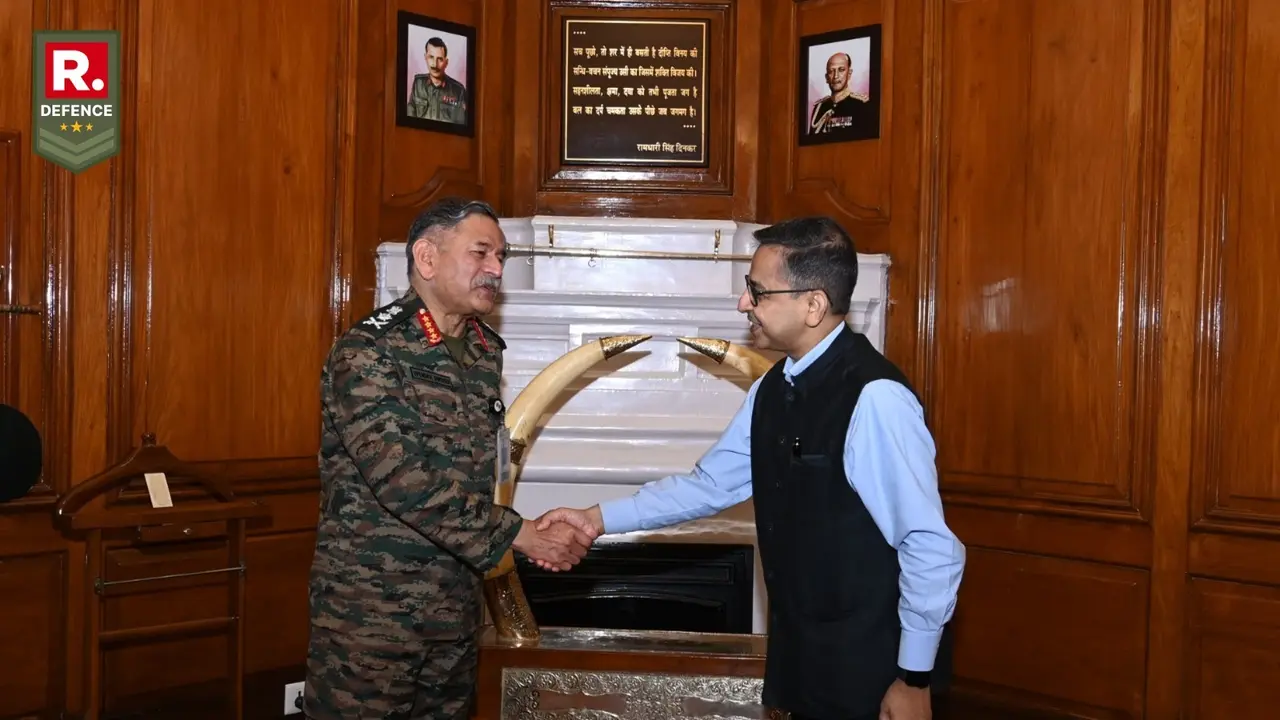Updated 31 March 2025 at 14:02 IST
Indian Army Chief, Bangladesh High Commissioner Explore Defence Ties amid Dhaka’s Tilt Towards China and Pakistan
India and Bangladesh reaffirmed defence ties on Friday as Indian High Commissioner Pranay Verma met Army Chief General Upendra Dwivedi.
- Defence News
- 4 min read

New Delhi, India - While India and Bangladesh exchanged handshakes over defence ties, Dhaka was busy finalizing deals with China and rolling out the red carpet for Pakistan’s intelligence operatives. On Friday, the Indian High Commissioner to Bangladesh, Pranay Verma, met with Chief of Army Staff General Upendra Dwivedi to discuss regional security and military collaboration. But behind the scenes, Bangladesh was making moves that could significantly alter the power dynamics in South Asia.
According to an Indian Army post on X, Verma and Dwivedi talked about strengthening bilateral defence cooperation and joint initiatives. A standard diplomatic engagement on the surface, but India has reasons to be uneasy. The very same day, Bangladesh signed an agreement with China for economic and technical cooperation, along with eight MoUs covering everything from news exchange to sports and healthcare. More concerning, Pakistan’s ISI had boots on the ground in Dhaka, meeting with Bangladesh’s military intelligence officials for the first time in over a decade.
China’s Billions and Pakistan’s Military Embrace: What’s Happening in Dhaka?
Bangladesh’s interim leadership, under Chief Adviser Muhammad Yunus, has secured $2.1 billion in investments, loans, and grants from China—a significant financial boost amid growing economic instability. Nearly 30 Chinese companies have pledged to invest $1 billion in the Chinese Industrial Economic Zone, while Beijing has promised:
- $400 million for modernizing Mongla Port,
- $350 million for developing the China Industrial Economic Zone,
- $150 million in technical assistance,
The rest is in grants and loans aimed at tightening China’s economic grip on Bangladesh.
Advertisement
Meanwhile, the once-dormant Dhaka-Islamabad military ties are suddenly seeing a revival. Pakistan’s ISI has sent a delegation to Bangladesh, led by Major General Shahid Amir Afsar, Director General of Analysis. This marks the first high-level ISI visit to Dhaka in over ten years. The timing is no coincidence.

Just a week before, Bangladesh’s military delegation, led by Lt Gen SM Kamrul Hasan, was in Pakistan, holding talks with top officials, including Army Chief General Asim Munir. The outcome? A clear push to strengthen military cooperation, intelligence-sharing, and security ties.
Advertisement
From Secularism to Islamist Stronghold? The Troubling Shift in Bangladesh
For years, Sheikh Hasina’s government walked a tightrope—pushing economic growth while keeping Islamist elements in check. That balance is now in question. Since Hasina’s ouster, Bangladesh has seen a rise in attacks on Hindu minorities, fueling fears of growing religious extremism. The interim government's increased military engagement with Pakistan, a country that has long tried to regain influence in Dhaka, is also a cause of concern.
Signs of a broader geopolitical shift, with Bangladesh’s interim leadership leaning closer to China’s economic clout and Pakistan’s security apparatus. This pivot is setting off alarms in New Delhi, where security experts are concerned about the revival of anti-India militant networks in Bangladesh—many of which have historical ties to Pakistan’s ISI.
Pakistan’s Playbook: ISI’s Growing Footprint in Bangladesh
Pakistan has been itching to restore its influence in Bangladesh, and Muhammad Yunus’s government is giving them an open door. The ISI’s delegation has already met with Bangladesh’s Directorate General of Forces Intelligence (DGFI) and other military agencies. The exact details of these discussions remain undisclosed, but intelligence-sharing and defence cooperation are on the table.

This visit follows a pattern seen in past decades—where Pakistan uses military ties and intelligence-sharing to embed its strategic interests in Bangladesh. India, having long countered Islamabad’s influence in Dhaka under Hasina’s rule, now faces a shifting equation.
India’s Nightmare: A China-Pakistan-Bangladesh Nexus?
Bangladesh’s newfound enthusiasm for Pakistani military cooperation, coupled with China’s deep financial investments, spells trouble for India. The strategic concern is clear. The Indo-Bangladesh border (4,000 km long) has long been a weak point for infiltration and smuggling. The Siliguri Corridor ("Chicken’s Neck"), India’s critical link to the Northeast, is at risk if Islamist and anti-India elements regain strength in Bangladesh.

Groups like Jamaat-ul-Mujahideen Bangladesh (JMB), which has ties to Pakistan, could see a resurgence, further destabilizing India’s eastern flank. For years, Hasina’s government ensured Pakistan’s influence remained minimal, and China’s economic hand didn’t translate into military dominance. But with Yunus at the helm, Dhaka’s political compass is pointing in a different direction—one that could fundamentally reshape the region’s security balance.
Watch- Bangladesh News: Coup On To Overthrow Yunus? Army Holds Emergency Meet
Published By : Yuvraj Tyagi
Published On: 31 March 2025 at 14:02 IST
